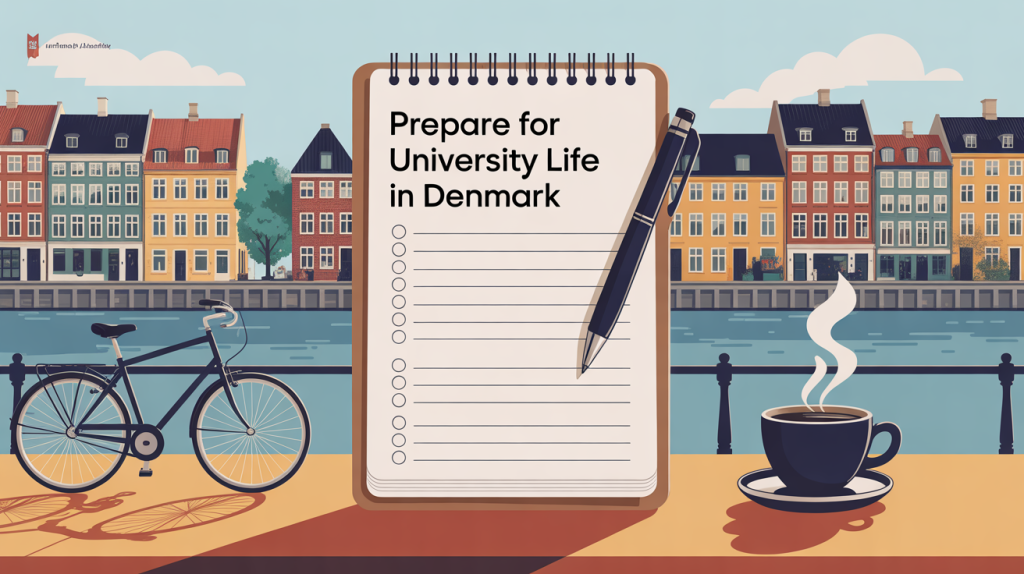How to Prepare for University Life in Denmark: An International Student’s Checklist
Essential Pre-Arrival Checklist
- Acceptance Letter
Secure your official acceptance letter from your Danish university. This document is essential for obtaining your residence permit and completing other formalities. - Student Residence Permit
Apply for your student permit (ST1 form) as soon as you receive your acceptance. The application must be filled out and signed, and you will need a Case Order ID and a payment receipt. Ensure that you submit this application as soon as possible to avoid delays. - Valid Passport
Confirm that your passport is valid for at least three months beyond the end date of your residence permit and has at least two blank pages for visa stamps. - Proof of Sufficient Funds
Be prepared to show proof that you can financially support yourself during your studies in Denmark. International students typically need to demonstrate access to a minimum amount (e.g., $1,000 per month) through bank statements or a financial letter from your university. - Health Insurance
Arrange for health insurance coverage for your stay. The specifics may vary based on your nationality and the length of your stay. EU/EEA students can use the European Health Insurance Card, while non-EU/EEA students should assess their eligibility for specific health insurance plans. - Notarized Consent (if under 18)
If you are under 18, provide a notarized letter of consent from your parents along with a copy of your birth certificate. - Application and Service Fees
Pay all relevant fees to the Danish authorities and keep your receipts, which may need to be shown when submitting documentation.
Additional Practical Preparation
- Accommodation: Start looking for student housing or private accommodation before your arrival. Housing can be competitive in cities where universities are located, so securing a place promptly is crucial.
- Travel Arrangements: Book your flights early. Aim to arrive before orientation weeks and the start of classes to acclimate to your new environment.
- Documentation: Make copies of all essential documents (passport, acceptance letter, health insurance, proof of funds) to avoid complications.
- Medication and Prescriptions: If you require regular medication, bring an adequate supply and documentation (translated if needed), as Danish pharmacies may require this for dispensing medications.
- Vaccinations and Health Checks: Check if any health checks or vaccinations are required based on your country of origin to ensure compliance with Danish regulations.
- Emergency Contacts: Compile a list of important contacts, including your university’s international office, accommodation provider, and the local embassy. This information can be crucial for support during your transition.
Upon Arrival in Denmark
- Residence Registration: After arrival, register your residence in Denmark as required. Both your university and the local municipality (kommune) provide guidance on the process.
- Receive CPR Number: Obtain your Danish civil registration number (CPR), which you will need for healthcare, banking, and other everyday matters.
- Activate Student Services: Participate in introduction activities to help familiarize yourself with your university, city, and Danish culture. Engaging with other students and staff can ease your transition significantly.
Summary Table: Key Documents and Actions
| Task | Required Document(s) | Notes |
|---|---|---|
| Apply for Student Permit | ST1 Form, Acceptance Letter, Passport, Case Order ID | Apply early to avoid delays |
| Prove Sufficient Funds | Bank Statement/Financial Letter | Minimum monthly amount required |
| Prepare Travel and Accommodation | Travel Tickets, Housing Confirmation | Arrange in advance |
| Arrange Health Insurance | Health Insurance Card/Proof | Required for the duration of stay |
| Prepare for Special Medical Needs | Prescription, Doctor’s Note, Translations | For medication access in Denmark |
| Pay Fees and Collect Receipts | Payment Receipts | For consulate and service fees |
Conclusion
Transitioning to university life in Denmark can be daunting, but with careful preparation and adherence to guidelines, you can enhance your experience and focus on your studies. For further assistance, explore the resources available on Study in Denmark, where we provide tailored guidance for international students seeking to navigate their educational journey in Denmark. If you are an educational recruiter, university admissions team, or HR professional, do not hesitate to reach out for potential partnerships or to discuss how we can support your initiatives in attracting and assisting international students.
Take the Next Step with Study in Austria
Explore further resources to assist you in your journey:


